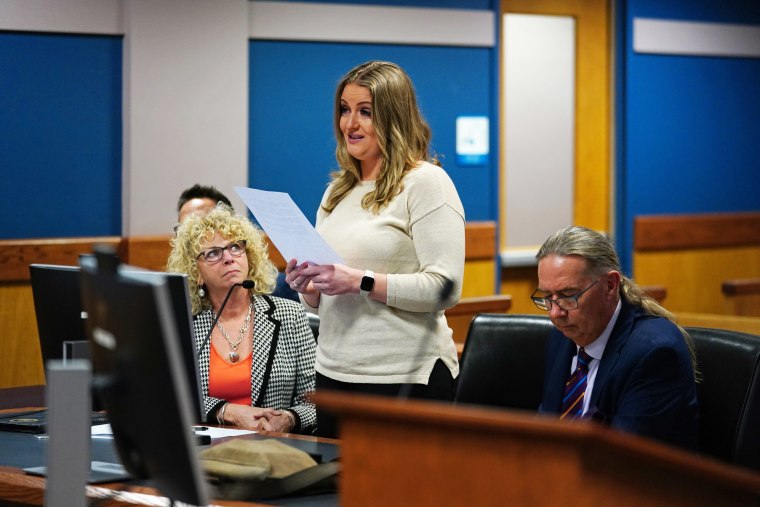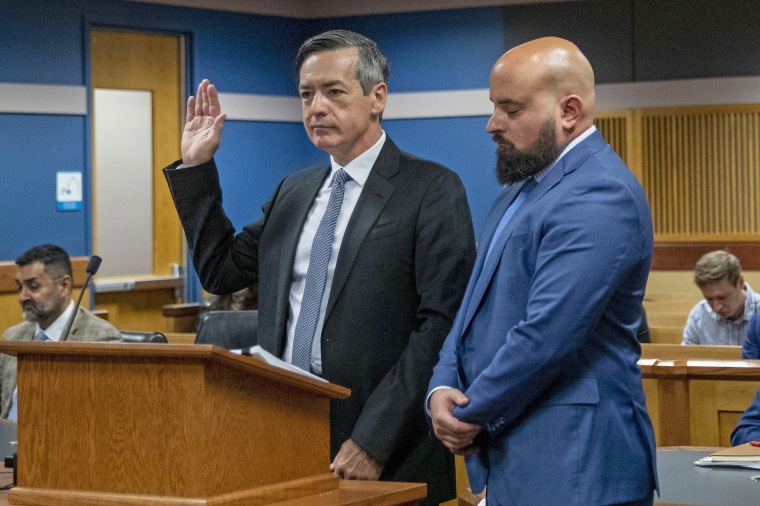ATLANTA — The judge in the Georgia election interference case has granted a request from Fulton County District Attorney Fani Willis' office for an emergency protective order after parts of videos from key witnesses against former President Donald Trump and his allies were leaked to news outlets.Judge Scott McAfee on Thursday issued a protective order that prohibits attorneys in the case from sharing sensitive materials with the public. The order requires prosecutors to physically label evidence it seeks to protect as “sensitive material” and gives defense attorneys 14 days to contest any designations they disagree with. Willis’ team now has 30 days to review all discovery they’ve already provided and label as sensitive.
McAfee said that the order would promote the flow of pre-trial discovery and, more importantly, protect the jury pool from evidence that may be deemed inadmissible at trial.
“The Court has an interest in ensuring that all parties retain their right to a fair trial before an unbiased jury, a process that could become unattainable should the public be allowed to vet every piece of unfiltered evidence months before trial,” McAfee wrote in the filing.

Willis’ office asked for the protective order in a court filing Tuesday after parts of the videotaped statements of Jenna Ellis, Sidney Powell and Kenneth Chesebro and bail bondsman Scott Hall were made public. In its filing, Willis' office argued that an order was necessary “to protect witnesses and to safeguard sensitive and confidential information” during the discovery process. It said the leaks were “clearly intended to intimidate witnesses in this case, subjecting them to harassment and threats prior to trial.”
The DA in August charged 19 defendants with violating Georgia’s Racketeer Influenced and Corrupt Organization act in connection with efforts to overturn the 2020 election results in the battleground state. Chesebro, Ellis, Hall and Powell have pleaded guilty. The videotaped statements, known as proffer videos, were made pursuant to the four defendants’ plea agreements, which required them to give true and accurate information to prosecutors.
The Ellis and Powell statements were first reported by ABC News, while the Chesebro and Hall statements were first reported by The Washington Post. The recordings, which have not been independently obtained by NBC News, revealed new details of the defendants' testimony to prosecutors.
The videos showed Ellis recalling a conversation with Trump adviser Dan Scavino, who told her that Trump would not depart the White House regardless of the election results, she said. Powell had testified that Trump was repeatedly told by others that he’d lost the election to President Joe Biden.
A lawyer for Trump co-defendant Misty Hampton admitted at a hearing Wednesday that he had shared witness proffer videos of key figures in the case with a media outlet, saying he thought it was in his client’s best interest.
Jonathan Miller, an attorney for Hampton, made the admission during an emergency hearing Wednesday for the protective order. Hampton is charged with a scheme to access voting machines in Coffee County, which Powell and Hall were also charged with.
“In being transparent with the court and to make sure that nobody else gets blamed for what happened and so that I can go to sleep well tonight, judge, I did release those videos to one outlet,” Miller told McAfee during the hearing. “In all candor to the court, I need the court to know that."
McAfee had signaled Wednesday that he would issue a protective order barring the disclosure of certain discovery information by Thursday morning. He said the order would institute a process by which parties can label certain evidence as sensitive.
“Until we decide what’s going to be relevant and admissible, this case should be tried and not in the court of public opinion,” McAfee said during Wednesday's hearing.
Tom Clyde, an attorney for a coalition of media organizations that did not include NBC News, objected to the protective order, citing First Amendment interests, during the hearing Wednesday.
“Essentially what the state and the defendants are trying to do is get the authority of the court behind an order that will impose secrecy on information that is exchanged during the discovery process. Notwithstanding how newsworthy that information is, notwithstanding how much it might inform the public about the circumstances of this case, but particularly in this case, the circumstances of an election that took place, that’s extremely significant in public importance,” Clyde said.
McAfee said he disagreed with Clyde’s arguments, but acknowledged the First Amendment concerns. The judge said a protective order was needed to protect the jury pool and to keep the flow of discovery going.
“Until we decide what’s going to be relevant and admissible, this case should be tried and not in the court of public opinion,” he said during the hearing Wednesday. “We’ve already seen what may happen when a protective order is not in place.”
The next hearing in this case is scheduled for Dec. 1, when several motions from defendants will be argued.
Charlie Gile reported from Atlanta, and Summer Concepcion from New York.

